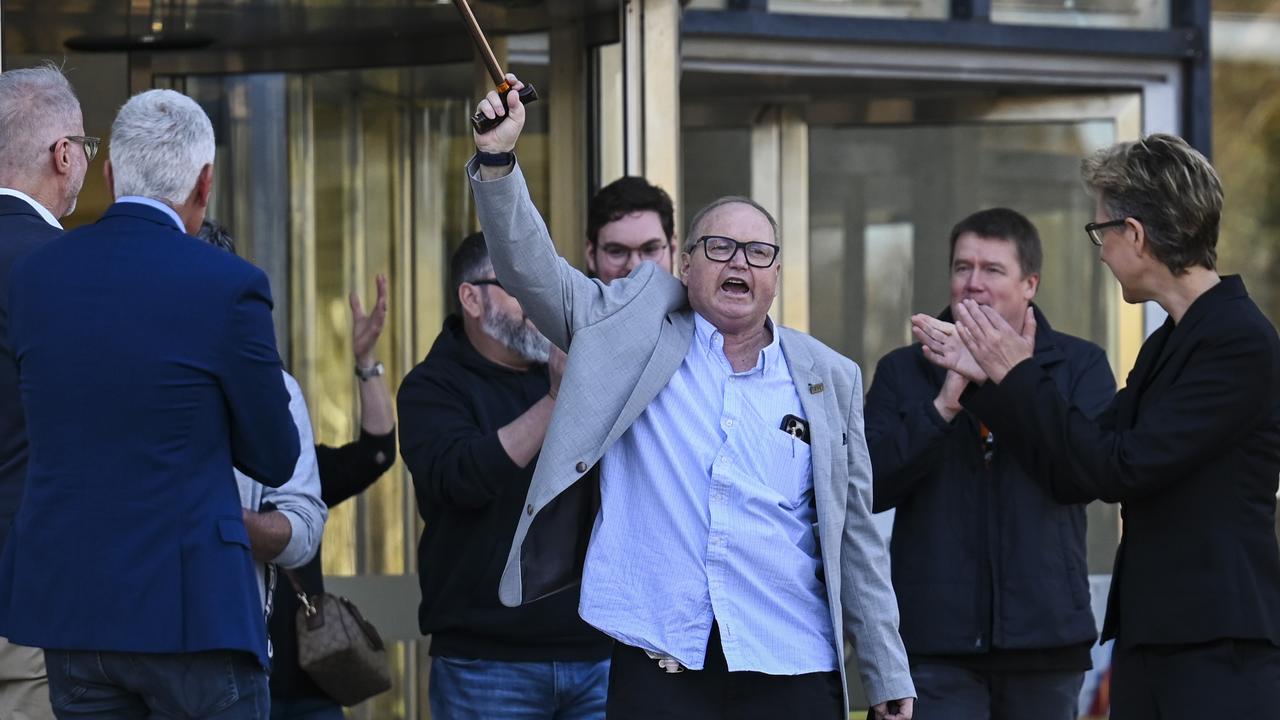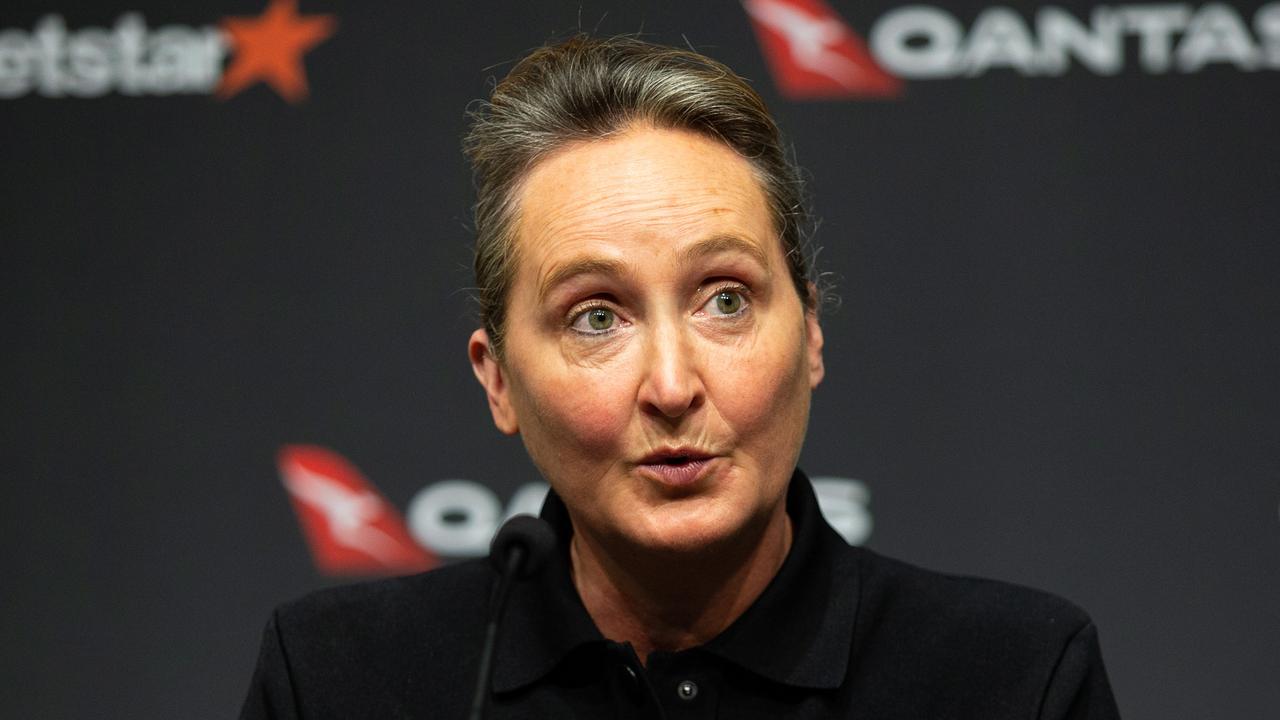Qantas faces $200m-plus penalty for illegal outsourcing
Qantas has apologised to workers whose jobs were illegally outsourced during the pandemic, after a High Court ruling went against the airline.

Business
Don't miss out on the headlines from Business. Followed categories will be added to My News.
Qantas is facing a $200m fine and intense pressure for an extensive board clean out after the High Court upheld two previous rulings that the airline’s outsourcing of 1700 workers during the Covid pandemic was unlawful.
New CEO Vanessa Hudson was keeping her head down after the explosive finding was delivered, and chair Richard Goyder did not return calls as the Transport Workers Union demanded he follow ex-CEO Alan Joyce out the door.
TWU national secretary Michael Kaine said the final act of the chair should be to strip Mr Joyce of his multi-million dollar bonuses and then leave, along with his directors.
“The airline cannot achieve the reset necessary for its survival under the same board that presided over the largest case of illegal sackings in Australian corporate history,” said Mr Kaine. “Qantas needs a fresh start.”
The High Court decision comes at a torrid time for Qantas already under pressure over travel credits, high airfares, extravagant executive bonuses, allegations of slot hoarding and another potentially costly lawsuit filed by the consumer watchdog last month.
ACCC chair Gina Cass-Gottlieb planned to seek a $250m penalty against Qantas over claims the airline sold tickets on already cancelled flights for several months last year.
Along with the outsourcing penalty, the cases threatened to knock a sizeable chunk out of Qantas’s bottom line, even after it posted a record $1.74bn net profit for the year to June 30.
Maurice Blackburn Lawyers principal Josh Bornstein who led the TWU’s legal action in the outsourcing matter, refused to speculate on the amount of compensation or penalty, but suggested it was “a huge sum of compensation we’re talking about”.
“The union will be seeking a very significant penalty in recognition that Qantas has already profited in the sum of at least $300 million from its illegal conduct and any penalty has to be an effective deterrent both for Qantas and, more generally, amongst the corporate community,” said Mr Bornstein.

Qantas said it would reach out to the TWU “to discuss reaching agreement on a settlement for the people involved as reasonably and quickly as possible”.
A statement also offered an apology to the workers affected, saying “we deeply regret the personal impact the outsourcing decision had on all those affected”.
The decision to contract out the jobs of baggage handlers, ramp workers and cleaners was made by Qantas during the Covid pandemic, on the premise it would save the airline $100m a year in labour costs and $80m over five years in equipment.
But the TWU believed there was more to it, and took Qantas to the Federal Court, arguing the airline was motivated by “prohibited reasons” including a desire to prevent strikes by the workers when travel was about to restart.
Under reverse onus of proof requirements, Qantas fell short in the eyes of Federal Court justice Michael Lee, who was not satisfied that commercial reasons were the sole motivation for the mass sackings.
In response Qantas doggedly pursued the matter all the way to the High Court, in the belief the airline’s actions would be found to be lawful.
In a unanimous judgment, the High Court’s seven judges agreed Justice Lee’s decision was right and Qantas was in breach of the Fair Work Act.
Throughout the two-and-a-half years of court battles, Qantas maintained the “sole decision maker” in the outsourcing was their head of domestic and international Andrew David.
Incredibly high level executive meetings at which such matters were discussed, were not recorded and there were no minutes kept, Qantas’ lawyers claimed in court.
Such circumstances allowed Mr Joyce and then chief financial officer Vanessa Hudson to stay out of the widening controversy.
It was unclear what role the board played, even though Mr Goyder previously indicated that he was heavily involved in Qantas’ strategy during the Covid crisis.
Unions remained hopeful the High Court decision would lead to a new approach to business by the airline, under Ms Hudson.
Australian Services Union assistant national secretary Emaline Gaske said it was clear that putting profits ahead of people was not working too well for Qantas.
“Qantas has been in the news for all the wrong reasons and new management has a serious task ahead of it to rebuild the trust of workers and the travelling public,” she said.
The ACTU said Qantas had been “the poster child of exploiting loopholes to outsource jobs and suppress wages and conditions” and the TWU should be congratulated for standing up for its members.
Labor senator and former TWU secretary Tony Sheldon said the case highlighted why parliament needed to pass the Albanese government’s “closing the loopholes” bill.
He said Mr Joyce split the Qantas workforce across 38 companies “to destroy the fair pay and working conditions Qantas workers used to enjoy”.
“In doing so, he has set a blueprint that other employers like BHP are now using to do the same thing,” Senator Sheldon said.
More Coverage
Originally published as Qantas faces $200m-plus penalty for illegal outsourcing








